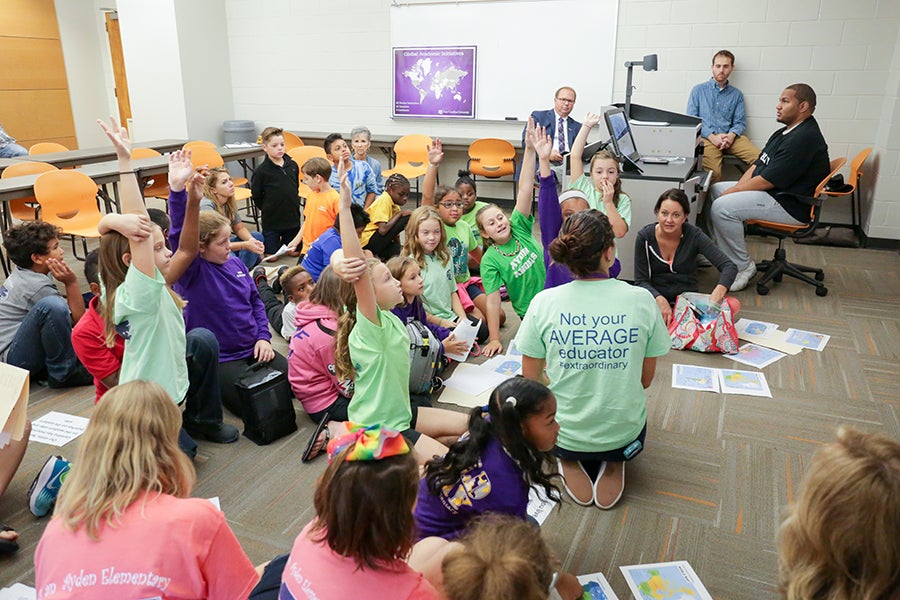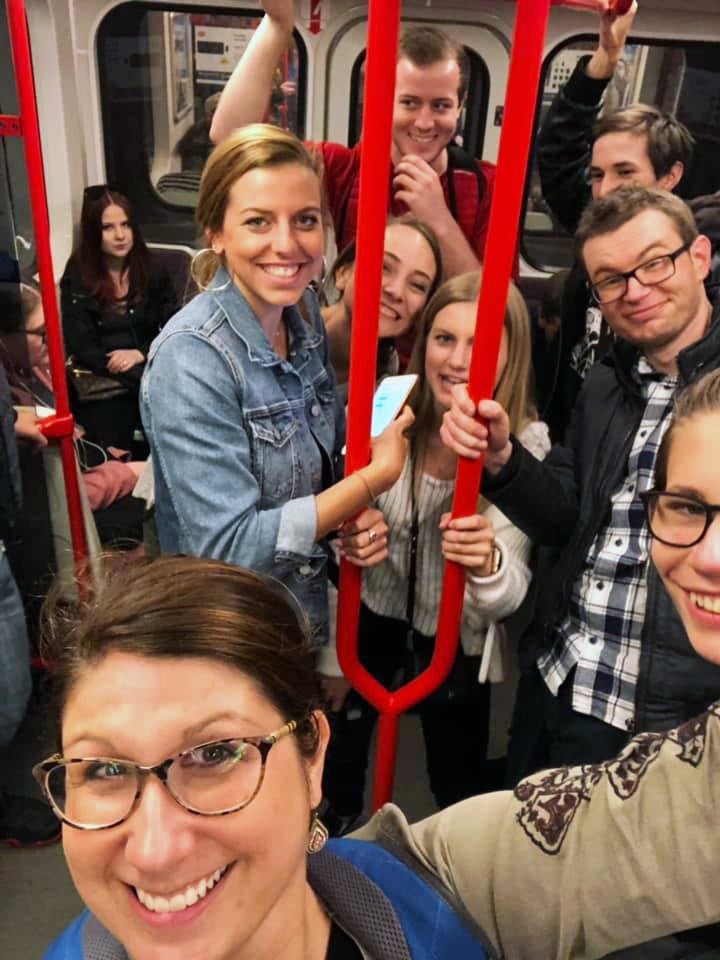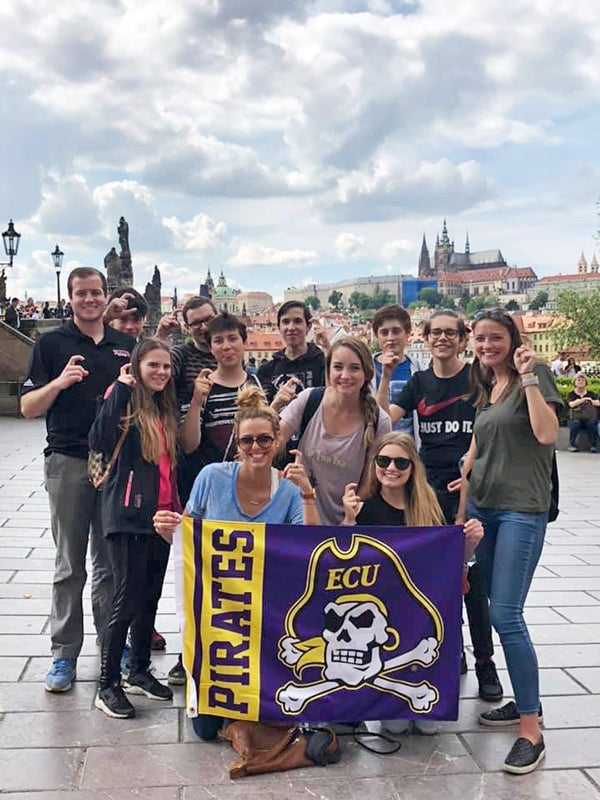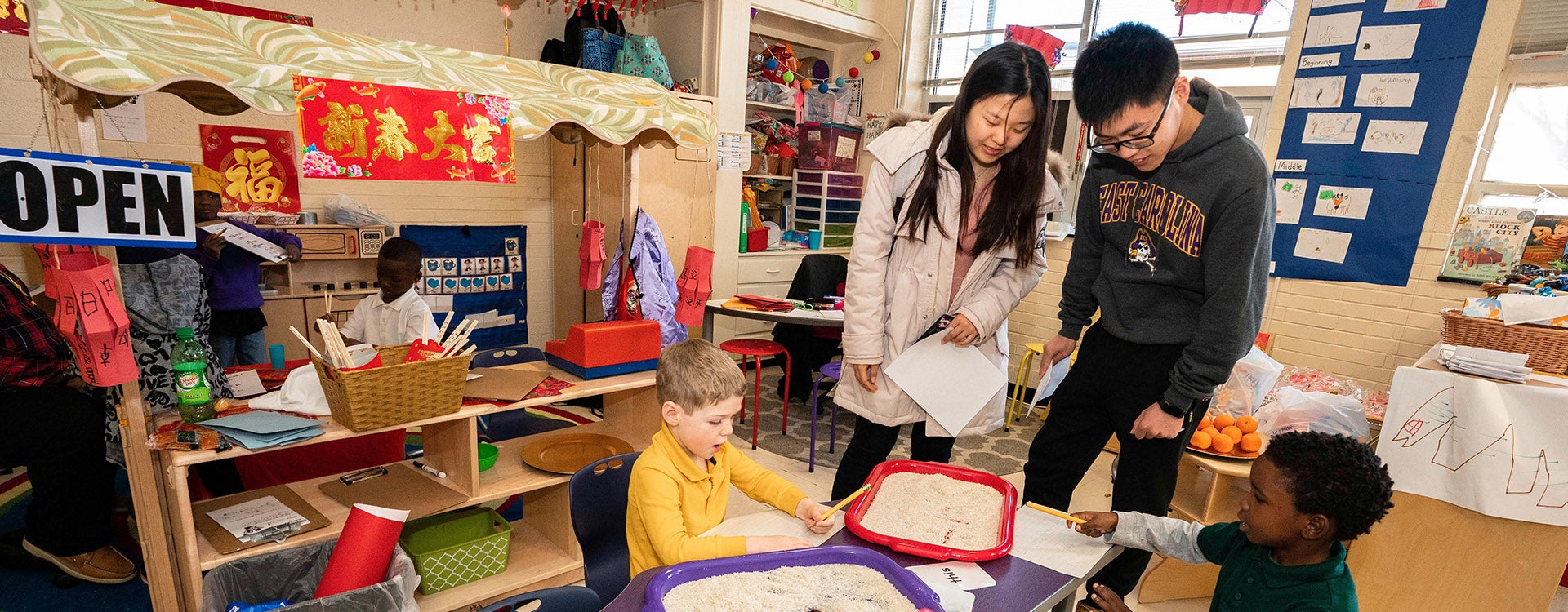College of Education shares expertise, opportunities internationally
It started with a student exchange program and led to an email from the prime minister of the Czech Republic.
When Dr. Tosha Owens was in high school, an exchange student from the Czech Republic lived with her family. The two stayed in touch, which led Owens to work closely with the country’s Ministry of Education on implementing positive behavior interventions and supports (PBIS) in special education.
Owens’ partnership with the Czech Republic is one of the ways that the East Carolina University College of Education interacts with the global community. Students participate in global virtual exchange courses, faculty-led study abroad, exchange programs and co-curricular experiences in international venues. Faculty work on teaching and research projects with global partners and frequently attend and present at international conferences.

Fourth-graders from Ayden Elementary School talked with a partner class from Port Coquitlam, British Columbia in ECU’s global classroom during the 2017 Global Read Aloud. (Photo by Cole Dittmer)
“As a historic leader in the preparation of a broad range of educational professionals in the state, region and nation, we are now becoming known as an international leader on many fronts with our award-winning faculty spanning the globe sharing their expertise and creating opportunities for our students,” said Dr. Allen Guidry, the COE assistant dean for planning and global engagement.
Faculty members like Owens provide guidance to people who are tackling social and educational problems where they live while also learning from their experiences.
“We are not alone in solving societal and educational problems, and when we connect with those in different contexts, but with similar problems, we are able to see how we might approach our own contexts differently and, perhaps, more effectively,” Guidry said.
Understanding the Czech Republic’s approach to special education was one of the biggest hurdles that Owens faced. She was able to visit the country several times and was able to meet with a teacher at one of the institutions where her friend worked.
“The Czech people are very interesting,” Owens said. “They’re closed off. There’s a huge wall until they realize you don’t want to just take from them. The only way I got to meet him was because my friend was able to break down that wall and say, ‘She’s interested in the school system here and if there’s a possible collaboration.’”
After a lot of discussion with that teacher and others, Owens’ initial thought was to help the schools become more inclusive. Many students who have any type of disability are enrolled in schools different from their peers.
“The teachers give them a grade based on their behavior,” Owens said. “What ends up happening is the kids with behavior problems get poor grades, which prevents them from going on to a better school. Once you finish ninth grade, your trajectory in life is pretty much set. You’ll go to a trade school, a college-readiness program, or get a regular high school diploma. Your path is set pretty well and the perception of who you will be is put in place there. It perpetuates the issue of ‘I’m a behavior problem and I’ll always be a behavior problem.’ It becomes a lifelong challenge.”
She contacted the Ministry of Education’s special education department and asked about the biggest challenges facing education. The answer was inclusion and behavior.
“Originally, I was planning on doing inclusion because that seemed to be their bigger need and there was a bigger push from the ministry and prime minister on inclusion,” Owens said. “On my next trip, when I conducted a study abroad and dug deeper into the school system, I realized they are not in a place right now to sustain inclusion. They could definitely include many of the students they don’t currently include in their mainstream education, but as far as students who have more significant needs and who are considered to have an intellectual disability, they are not prepared because they don’t have special education teachers in every school.”

Dr. Tosha Owens, bottom left, led a study abroad trip for College of Education students to Prague, Czech Republic in June 2019. The group took the metro during their visit. (Contributed photo)
In the Czech Republic, special educators are in more of a consultant role where they may visit the school on a weekly or biweekly basis, but they don’t have someone who works with teachers daily. According to Owens, there would need to be a lot of systemic changes before inclusion can happen and be sustainable.
Her study abroad program in June 2019 focused on ECU students creating a positive behavior support presentation to be shared with Czech educators.
“My students met with the Ministry of Education, the same people I met with, and we asked them if they would be interested in hearing about positive behavior support,” Owens said. “They loved it! They said this was what they needed.”
According to Owens, positive behavior support is a tiered system framework that can be adjusted for many contexts. The first tier is the universal tier, where schoolwide expectations are set.
“Students are taught proactively. This is our code of conduct and this is what we all believe in,” she said. “Students are positively reinforced for engaging in positive behaviors.”
The second tier is for students who may need additional support. Typically, Owens said, 80% of students respond to the first tier but about 15% need a little extra help.
“Usually, you give them that extra intervention where you have a small group or some bolstering up of another skill where you’re still seeing a lot of challenges out on the playground with school safety,” she said.
The third tier targets the 5% that don’t respond to the first or second tier. These students, she said, need the most direct and individualized instruction.
Owens and her students worked with a school to potentially create a pilot program to see if this system would work across the Czech Republic like it does in the United States.
“We’re going to plan one or two pilot schools and use them as models to scale up,” she said. “Then, we’ll take the data to see what things we need to tighten up or what the effectiveness of different variables is.”

College of Education students visited Prague with Dr. Tosha Owens in June 2019. While there, they met with officials from the Czech Republic’s Ministry of Education. (Contributed photo)
Owens said one of the biggest problems facing the Czech Republic is a lack of support and resources.
“They rely on what they do know, but of course when you try to put the research that’s done in other countries and place it in a context that doesn’t match your own, it’s really hard to translate it,” she said. “My goal is to begin to build leaders in a capacity in the country so that there can be this bigger systematic change where we’re looking at why we’re not including students and how we go about getting the skills to support those students. A bigger understanding of how we even go about doing that.”
Owens is one of several College of Education (COE) faculty members who partner with universities across the globe through study abroad, exchange programs and the sharing of ideas.
Faculty members are not the only ones who benefit from global interactions. Students gain new skill sets and develop cultural competence. There are a variety of study abroad experiences the COE offers from central and South America to western, central and eastern Europe.
“The problem solving that is required to negotiate an extended period of time in a different country teaches invaluable lessons and leaves the participant a more confident person. There are a lot of soft skills, like problem solving, creative thinking, and ‘grit’ that are developed that are very attractive to potential employers and serve our study abroad participant well in their internships and workplace,” Guidry said.
For some students, study abroad may not be feasible. To ensure that all students can have some type of global experience, the university offers Global Understandings (GU) courses in a range of general education program areas. Students discuss topics and design projects with students from schools in three different countries.
“Since our GU courses are designed to be multilateral exchanges, students are afforded the opportunity to interact with students in up to three institutions in one semester, all while sitting in a classroom on ECU’s campus. It’s an innovative and effective way to provide access to meaningful intercultural learning experiences,” he said.
The COE encourages students to participate in at least one global experience during their time at ECU. These interactions have a broad impact on their role as future educators.
“I have an incredible colleague in the area of childhood literacy that has written about the importance of using literature to provide cultural widows and mirrors for students. I see the value in global interactions for educators in our programs very similarly,” Guidry said. “When we interact with our counterparts in different international settings, we are not only provided a window into their context that allows us to understand their humanity, but we are also provided a mirror for our own context and understanding that causes us to question our own humanity.”
To learn more about the College of Education’s global initiatives, visit the Office of Global Engagement website.

Yueqi Li, left, and Zongfu Li from Shaanxi Normal University in China visit with students at ECU Community School in February 2019. The class was learning about Chinese New Year traditions. (Photo by Cliff Hollis)
-by Kristen Martin, University Communications